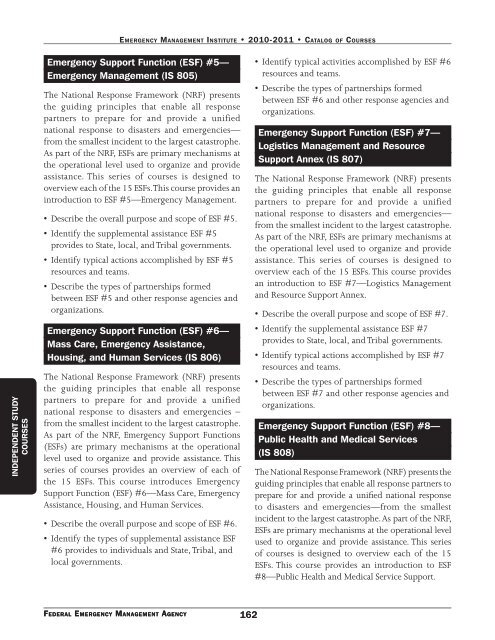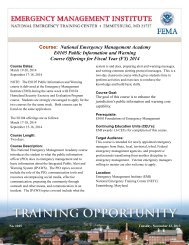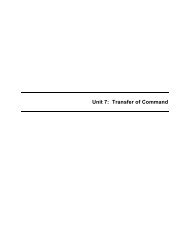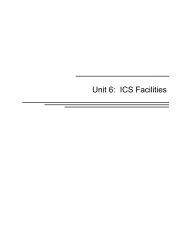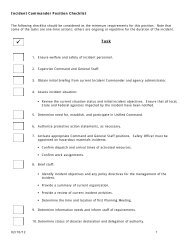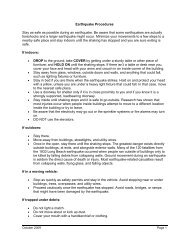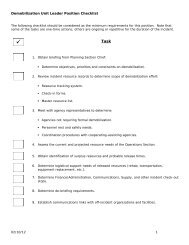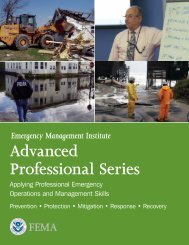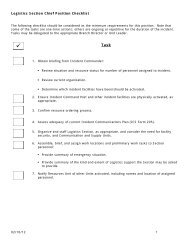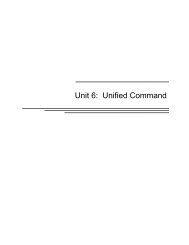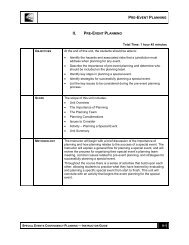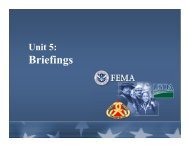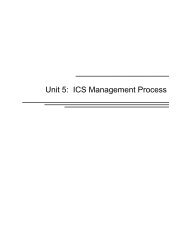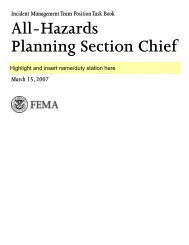enrollment for emi courses - Emergency Management Institute ...
enrollment for emi courses - Emergency Management Institute ...
enrollment for emi courses - Emergency Management Institute ...
You also want an ePaper? Increase the reach of your titles
YUMPU automatically turns print PDFs into web optimized ePapers that Google loves.
InDEpEnDEnt stuDy<br />
cOursEs<br />
EmE r g E n c y ma n a g E m E n t In s t I t u t E • 2010-2011 • ca t a l o g of co u r s E s<br />
<strong>Emergency</strong> support function (Esf) #5—<br />
<strong>Emergency</strong> management (Is 805)<br />
The National Response Framework (NRF) presents<br />
the guiding principles that enable all response<br />
partners to prepare <strong>for</strong> and provide a unified<br />
national response to disasters and emergencies—<br />
from the smallest incident to the largest catastrophe.<br />
As part of the NRF, ESFs are primary mechanisms at<br />
the operational level used to organize and provide<br />
assistance. This series of <strong>courses</strong> is designed to<br />
overview each of the 15 ESFs. This course provides an<br />
introduction to ESF #5—<strong>Emergency</strong> <strong>Management</strong>.<br />
• Describe the overall purpose and scope of ESF #5.<br />
• Identify the supplemental assistance ESF #5<br />
provides to State, local, and Tribal governments.<br />
• Identify typical actions accomplished by ESF #5<br />
resources and teams.<br />
• Describe the types of partnerships <strong>for</strong>med<br />
between ESF #5 and other response agencies and<br />
organizations.<br />
<strong>Emergency</strong> support function (Esf) #6—<br />
mass care, <strong>Emergency</strong> assistance,<br />
Housing, and Human services (Is 806)<br />
The National Response Framework (NRF) presents<br />
the guiding principles that enable all response<br />
partners to prepare <strong>for</strong> and provide a unified<br />
national response to disasters and emergencies –<br />
from the smallest incident to the largest catastrophe.<br />
As part of the NRF, <strong>Emergency</strong> Support Functions<br />
(ESFs) are primary mechanisms at the operational<br />
level used to organize and provide assistance. This<br />
series of <strong>courses</strong> provides an overview of each of<br />
the 15 ESFs. This course introduces <strong>Emergency</strong><br />
Support Function (ESF) #6—Mass Care, <strong>Emergency</strong><br />
Assistance, Housing, and Human Services.<br />
• Describe the overall purpose and scope of ESF #6.<br />
• Identify the types of supplemental assistance ESF<br />
#6 provides to individuals and State, Tribal, and<br />
local governments.<br />
FEd E r A L Em E r g E N C y mA N A g E m E N T Ag E N C y 162<br />
• Identify typical activities accomplished by ESF #6<br />
resources and teams.<br />
• Describe the types of partnerships <strong>for</strong>med<br />
between ESF #6 and other response agencies and<br />
organizations.<br />
<strong>Emergency</strong> support function (Esf) #7—<br />
logistics management and resource<br />
support annex (Is 807)<br />
The National Response Framework (NRF) presents<br />
the guiding principles that enable all response<br />
partners to prepare <strong>for</strong> and provide a unified<br />
national response to disasters and emergencies—<br />
from the smallest incident to the largest catastrophe.<br />
As part of the NRF, ESFs are primary mechanisms at<br />
the operational level used to organize and provide<br />
assistance. This series of <strong>courses</strong> is designed to<br />
overview each of the 15 ESFs. This course provides<br />
an introduction to ESF #7—Logistics <strong>Management</strong><br />
and Resource Support Annex.<br />
• Describe the overall purpose and scope of ESF #7.<br />
• Identify the supplemental assistance ESF #7<br />
provides to State, local, and Tribal governments.<br />
• Identify typical actions accomplished by ESF #7<br />
resources and teams.<br />
• Describe the types of partnerships <strong>for</strong>med<br />
between ESF #7 and other response agencies and<br />
organizations.<br />
<strong>Emergency</strong> support function (Esf) #8—<br />
public Health and medical services<br />
(Is 808)<br />
The National Response Framework (NRF) presents the<br />
guiding principles that enable all response partners to<br />
prepare <strong>for</strong> and provide a unified national response<br />
to disasters and emergencies—from the smallest<br />
incident to the largest catastrophe. As part of the NRF,<br />
ESFs are primary mechanisms at the operational level<br />
used to organize and provide assistance. This series<br />
of <strong>courses</strong> is designed to overview each of the 15<br />
ESFs. This course provides an introduction to ESF<br />
#8—Public Health and Medical Service Support.


